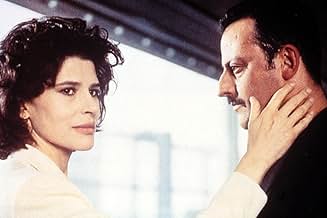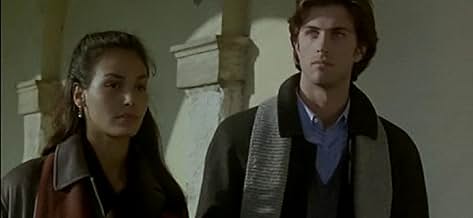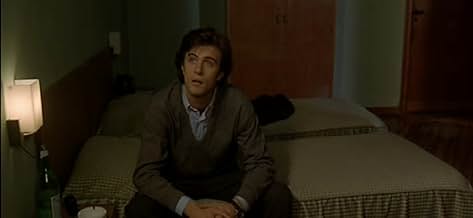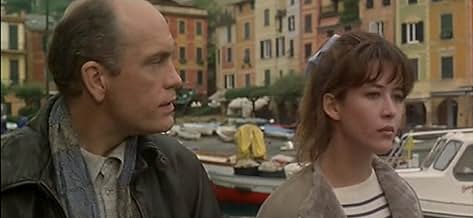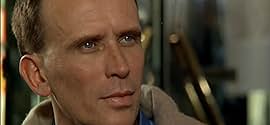CALIFICACIÓN DE IMDb
6.4/10
6.4 k
TU CALIFICACIÓN
Cuatro historias sobre relaciones cortas o largas entre hombres y mujeres en Italia y Francia.Cuatro historias sobre relaciones cortas o largas entre hombres y mujeres en Italia y Francia.Cuatro historias sobre relaciones cortas o largas entre hombres y mujeres en Italia y Francia.
- Dirección
- Guionistas
- Elenco
- Premios
- 3 premios ganados y 6 nominaciones en total
Kim Rossi Stuart
- Silvano
- (as Kim Rossi-Stuart)
Inés Sastre
- Carmen
- (as Ines Sastre)
Opiniones destacadas
Even though the story is light, the movie flows so beautifully and its visual so tranquil and poetic that it could almost carry the whole movie.
The film consists of four interconnected stories, all about different aspect of attraction between man and/or woman and how it frequently is ethereal. Their true desire seems to be always something that they cannot hold onto, it will flow out like a handful of sand.
I thought the most intriguing story was the last one where the more unattainable the woman was, the more the man desires her. It parallels her deep love for god, who is infinitely out of reach, but never closer to her heart.
A very good movie. 7/10
The film consists of four interconnected stories, all about different aspect of attraction between man and/or woman and how it frequently is ethereal. Their true desire seems to be always something that they cannot hold onto, it will flow out like a handful of sand.
I thought the most intriguing story was the last one where the more unattainable the woman was, the more the man desires her. It parallels her deep love for god, who is infinitely out of reach, but never closer to her heart.
A very good movie. 7/10
A summing up of all the aging, ailing Antonioni's career themes, strengths (visual beauty, a sense of mystery and poetry) and weaknesses (pretentious stiff dialogue, ideas that are sometimes not really all that deep, a penchant for getting beautiful actresses undressed without a lot of justification).
But this is also something quite different than he's ever done, in that these are a series of short stories, loosely tied together by sequences of John Malkovich playing a director looking for his next film (Wim Wenders helped the physically limited Antonioni by directing the Malkovich sections).
By keeping the pieces smaller, I found this more fun, and more moving than most of Antonioni's films. There isn't the chance for the ideas to run as thin, and there seems to be more empathy for his characters now. Humans may be screwed up, but at least Antonioni no longer stands above them judging. One moment actually brought me near tears. The film captures the lonely enigmatic solitude of the artist, and of life itself.
But this is also something quite different than he's ever done, in that these are a series of short stories, loosely tied together by sequences of John Malkovich playing a director looking for his next film (Wim Wenders helped the physically limited Antonioni by directing the Malkovich sections).
By keeping the pieces smaller, I found this more fun, and more moving than most of Antonioni's films. There isn't the chance for the ideas to run as thin, and there seems to be more empathy for his characters now. Humans may be screwed up, but at least Antonioni no longer stands above them judging. One moment actually brought me near tears. The film captures the lonely enigmatic solitude of the artist, and of life itself.
This is a special film if you know the context. Antonioni, in his eighties, had been crippled by a stroke. Mute and half paralyzed, his friends -- who incidentally are the best the film world has -- arranged for him to 'direct' a last significant film. The idea is that he can conjure a story into being by just looking at it. So we have a film: about a director who conjures stories by simple observation. And the matter of the (four) stories is about how the visual imagination defines love.
The film emerges by giving us the tools to bring it into being through our own imagination. The result is pure movie-world: every person (except the director) is lovely in aspect or movement. Some of these women are ultralovely, and they exist in a dreamy misty world of sensual encounter. There is no nuance, no hint that anything exists but what we see; no desire is at work other than what we create.
I know of no other film that so successfully manipulates our own visual yearning to have us create the world we see. He understands something about not touching. No one understands Van Morrison visually like he does. Morrison's Celtic space music is predicated on precisely the same notion: the sensual touch that implies but doesn't physically touch.
Antonioni's redhead wife appears, appropriately as the shopkeeper and she also directs a lackluster 'making of' film that is on the DVD.
Ted's Evaluation -- 3 of 4: Worth watching.
The film emerges by giving us the tools to bring it into being through our own imagination. The result is pure movie-world: every person (except the director) is lovely in aspect or movement. Some of these women are ultralovely, and they exist in a dreamy misty world of sensual encounter. There is no nuance, no hint that anything exists but what we see; no desire is at work other than what we create.
I know of no other film that so successfully manipulates our own visual yearning to have us create the world we see. He understands something about not touching. No one understands Van Morrison visually like he does. Morrison's Celtic space music is predicated on precisely the same notion: the sensual touch that implies but doesn't physically touch.
Antonioni's redhead wife appears, appropriately as the shopkeeper and she also directs a lackluster 'making of' film that is on the DVD.
Ted's Evaluation -- 3 of 4: Worth watching.
The worst segment in this very uneven sketch film is the first, a silly tale of abandonment featuring pretty boy Kim Rossi Stuart and the Lancôme model Inés Sastre. It reeks of chic and product placement. The second episode, with a bored-looking Sophie Marceau is hardly better; we can't care if she stabbed her dad six, twelve or 528 times. Sophie does have a lovely body, however, and the boutique she works in is elegant.
The triangle story is next, with Peter Weller playing a bilingual rich man with a wife (Fanny Ardant, sensational) and a mistress (Chiara Caselli, OK). Fanny's big scene has her smashing a vase then chewing out her straying hubby. She manages to be drunk, angry and horny all at once: I have never seen her act with such power. Pity that the little sequel with Jean Reno meeting Fanny in the empty apartment isn't very effective.
The last segment with Irène Jacob, a pretty girl with a big secret, is a little gem, but it feels tacked-on, not really a part of the picture.
The triangle story is next, with Peter Weller playing a bilingual rich man with a wife (Fanny Ardant, sensational) and a mistress (Chiara Caselli, OK). Fanny's big scene has her smashing a vase then chewing out her straying hubby. She manages to be drunk, angry and horny all at once: I have never seen her act with such power. Pity that the little sequel with Jean Reno meeting Fanny in the empty apartment isn't very effective.
The last segment with Irène Jacob, a pretty girl with a big secret, is a little gem, but it feels tacked-on, not really a part of the picture.
SPOILER: After the ecstatic reviews it received in the press, I found this film
disappointing. I can only imagine that the critics were being kind to an
ill, old man of 82 and overly respectful of the reputation of a once
great film director. Visually it is very attractive with beautiful shots of a lakeside
village and very atmospheric and poetic shots of alleyways and streets
in rain and mist. But when it comes to the actions and motivations of
the people in the film it is a let-down. I like to be able to believe in
and identify with the characters in a film and I couldn't do that here.
There are four stories in the film and I will mention only two - the two
that seem to me the most trite and pointless.
The first story stars two extremely good-looking newcomers to the screen
(Kim Rossi Stuart & Ines Sastre.) He stops his car to ask her the way to the nearest hotel, and because he
is so good-looking she gives him the name of her hotel. They see each
other during the day and when they retire to their rooms at night across
the landing from each other, she lies awake waiting for the knock on the
door that never comes. In the morning she leaves early without seeing
him. It is two years before they see each other again and this time
their relationship progresses a little further - they get to be naked on
the bed together. But he behaves in a very odd way indeed; for some five
minutes he runs his hands over her body within a millimetre of her skin
but without actually touching her. What she thinks is going on as she
lies there passively, feeling nothing, is anybody's guess. Then after
five minutes, still without having touched her, he gets up abruptly and
without speaking a word leaves. Is that the action of a sane man? You
wonder why he bothered to take his clothes off if he intended to do so
little. She, presumably feeling hurt and frustrated, rushes to the
window to see him walking off into the distance. They give each other a
feeble wave. End of story. John Malkovich's deep lugubrious voice-over
tells us that he behaved in this way either because of folly or pride.
Well it was certainly folly - and certainly unbelievable. Or could it
have been impotence? Could this story be saying something about the
impotence of an old man?
In another segment of the film, Malkovich's character is attracted to a
young woman (Sophia Marceau) he sees in a shop window. He can't take his
eyes off her and just stands there entranced. She reacts in the same
way. He goes into the shop and their silent fascination continues. I
felt uncomfortable for both of them. Was something momentous about to
happen? It would seem so and our interest is awakened, our expectations
aroused. But no; we are just being lead up the garden path to nowhere.
He sits outside and eventually she joins him. She tells him only one
thing about herself, that she has murdered her father by stabbing him
twelve times. Malkovich shows no surprise and the fact seems irrelevant.
They then go to her place and they have sex. But this is not the
beginning of some deep, meaningful relationship as the earlier
enchantment would lead us to suppose. Oh no. When he's had his sex he's
had enough and like the previous male protagonist, he just walks away.
Another wretched piece of behaviour and
disappointing. I can only imagine that the critics were being kind to an
ill, old man of 82 and overly respectful of the reputation of a once
great film director. Visually it is very attractive with beautiful shots of a lakeside
village and very atmospheric and poetic shots of alleyways and streets
in rain and mist. But when it comes to the actions and motivations of
the people in the film it is a let-down. I like to be able to believe in
and identify with the characters in a film and I couldn't do that here.
There are four stories in the film and I will mention only two - the two
that seem to me the most trite and pointless.
The first story stars two extremely good-looking newcomers to the screen
(Kim Rossi Stuart & Ines Sastre.) He stops his car to ask her the way to the nearest hotel, and because he
is so good-looking she gives him the name of her hotel. They see each
other during the day and when they retire to their rooms at night across
the landing from each other, she lies awake waiting for the knock on the
door that never comes. In the morning she leaves early without seeing
him. It is two years before they see each other again and this time
their relationship progresses a little further - they get to be naked on
the bed together. But he behaves in a very odd way indeed; for some five
minutes he runs his hands over her body within a millimetre of her skin
but without actually touching her. What she thinks is going on as she
lies there passively, feeling nothing, is anybody's guess. Then after
five minutes, still without having touched her, he gets up abruptly and
without speaking a word leaves. Is that the action of a sane man? You
wonder why he bothered to take his clothes off if he intended to do so
little. She, presumably feeling hurt and frustrated, rushes to the
window to see him walking off into the distance. They give each other a
feeble wave. End of story. John Malkovich's deep lugubrious voice-over
tells us that he behaved in this way either because of folly or pride.
Well it was certainly folly - and certainly unbelievable. Or could it
have been impotence? Could this story be saying something about the
impotence of an old man?
In another segment of the film, Malkovich's character is attracted to a
young woman (Sophia Marceau) he sees in a shop window. He can't take his
eyes off her and just stands there entranced. She reacts in the same
way. He goes into the shop and their silent fascination continues. I
felt uncomfortable for both of them. Was something momentous about to
happen? It would seem so and our interest is awakened, our expectations
aroused. But no; we are just being lead up the garden path to nowhere.
He sits outside and eventually she joins him. She tells him only one
thing about herself, that she has murdered her father by stabbing him
twelve times. Malkovich shows no surprise and the fact seems irrelevant.
They then go to her place and they have sex. But this is not the
beginning of some deep, meaningful relationship as the earlier
enchantment would lead us to suppose. Oh no. When he's had his sex he's
had enough and like the previous male protagonist, he just walks away.
Another wretched piece of behaviour and
¿Sabías que…?
- TriviaIn order to obtain the covering insurance needed to put the film into production, Michelangelo Antonioni (who was still recovering from a severely debilitating stroke) had to agree to have a secondary director on staff, ready to take over from him at any time. His choice, Wim Wenders, even provided the prologue and epilogue for the film.
- Versiones alternativasThere are two slightly different versions of the movie, the difference ocurring at the end. The US version of 'Beyond The Clouds' (Al di là delle nuvole, 1995) lacks the complete voice-over narration by John Malkovich's character at the end of the movie, from the moment he enters the hotel until the last image, before going to credits. The only line heard is: 'The director's profession is very peculiar...'; whereas the European cut of the movie contains a longer narration, also starting with the same line, but expanding until the last image before fading to credits. The voice-over talks about how the director's profession is to find images, only to discover another image beneath the previous one which is more faithful to the truth, and then another, and another, until you reach the one which equals reality, the one no one will ever see. Both versions are equally powerful in their own right, though it's interesting to note such a minor difference was made in the first place. Both versions are available, the US version was released in DVD, and the European version is available in VHS only.
- ConexionesFeatured in Fare un film è per me vivere (1995)
- Bandas sonorasUnknown Love
Written by Lucio Dalla and Robert Sidoli
Performed by Giuseppe D'Onghia (as Beppe Donghia) (piano) and Lucio Dalla (clarin)
Selecciones populares
Inicia sesión para calificar y agrega a la lista de videos para obtener recomendaciones personalizadas
- How long is Beyond the Clouds?Con tecnología de Alexa
Detalles
- Fecha de lanzamiento
- Países de origen
- Idiomas
- También se conoce como
- Beyond the Clouds
- Locaciones de filmación
- Productoras
- Ver más créditos de la compañía en IMDbPro
Taquilla
- Total en EE. UU. y Canadá
- USD 31,738
- Fin de semana de estreno en EE. UU. y Canadá
- USD 12,596
- 5 dic 1999
- Total a nivel mundial
- USD 31,738
- Tiempo de ejecución
- 1h 50min(110 min)
- Color
- Mezcla de sonido
- Relación de aspecto
- 1.66 : 1
Contribuir a esta página
Sugiere una edición o agrega el contenido que falta

